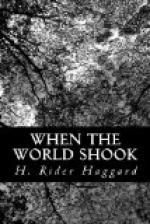Then the plunge of the enormous ship into the deep, its huge screws still whirling in the air and the boom of the bursting boilers. Lastly everything gone save a few boats floating on the quiet sea and around them dots that were the heads of struggling human beings.
“Let us go home,” said Oro. “I grow tired of this war of your Christian peoples. It is no better than that of the barbarian nations of the early world. Indeed it is worse, since then we worshipped Fate and but a few of us had wisdom. Now you all claim wisdom and declare that you worship a God of Mercy.”
With these words still ringing in my ears I woke up upon the Island of Orofena, filled with terror at the horrible possibilities of nightmare.
What else could it be? There was the brown and ancient cone of the extinct volcano. There were the tall palms of the main island and the lake glittering in the sunlight between. There was Bastin conducting a kind of Sunday school of Orofenans upon the point of the Rock of Offerings, as now he had obtained the leave of Oro to do. There was the mouth of the cave, and issuing from it Bickley, who by help of one of the hurricane lamps had been making an examination of the buried remains of what he supposed to be flying machines. Without doubt it was nightmare, and I would say nothing to them about it for fear of mockery.
Yet two nights later Oro came again and after the usual preliminaries, said:
“Humphrey, this night we will visit that mighty American nation, of which you have told me so much, and the other Neutral Countries.”
[At this point there is a gap in Mr. Arbuthnot’s M.S., so Oro’s reflections on the Neutral Nations, if any, remain unrecorded. It continues:]
On our homeward way we passed over Australia, making a detour to do so. Of the cities Oro took no account. He said that they were too large and too many, but the country interested him so much that I gathered he must have given great attention to agriculture at some time in the past. He pointed out to me that the climate was fine, and the land so fertile that with a proper system of irrigation and water-storage it could support tens of millions and feed not only itself but a great part of the outlying world.
“But where are the people?” he asked. “Outside of those huge hives,” and he indicated the great cities, “I see few of them, though doubtless some of the men are fighting in this war. Well, in the days to come this must be remedied.”
Over New Zealand, which he found beautiful, he shook his head for the same reason.
On another night we visited the East. China with its teeming millions interested him extremely, partly because he declared these to be the descendants of one of the barbarian nations of his own day. He made a remark to the effect that this race had always possessed points and capacities, and that he thought that with proper government and instruction their Chinese offspring would be of use in a regenerated world.




